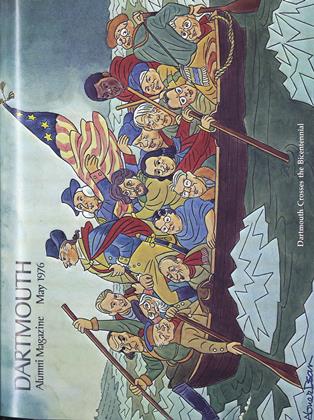OPTIONS & ALTERNATIVES
THE Daniel Oliver Associates are not insurance adjusters, accountants, or real estate brokers. They are a small group of students, faculty, and local residents who share, to a degree, a common love. They are all bibliophiles, with an abiding interest in the book arts of printing, graphics, binding, collecting, and bibliography.
The club was organized in 1934 with the help of assistant librarian Harold Goddard Rugg '06 and named after Daniel Oliver, class of 1785. Oliver, while he was a student, donated a number of books to the library. In appreciation, the Trustees, according to the records for the meeting of September 1783, "voted that the Vice-President be requested to return him the thanks of this board and request his acceptance of the use of the College Library free of charge during the term he shall continue a student at this College" - perhaps a substantial compensation at a time when the library was generally restricted to the exclusive use of the faculty.
The original list of volumes donated by Oliver reflects something of the content of that generation's college education (and of its spelling and punctuation):
Miller on Ranks in Society, Campbel on Revelation, Agar's Sermons, Brown's Estimate, Miller's Calender, the Sage's Triumph, Chauncey's Episcopacy, Langdon's Remarks, Burgh's Disquisitions, 3 vol., Mounteney's Demosthenes, Reed on the Mind, Fontenelle's Plurality of Worlds, Guthrie's Cicero, 3 vol., Sime's Military Guide, 2 vol., Curious Observations, 2 vol., Plautus Delphini, Calamet on Apparitions, Gavin on Popery, Thompson's Antoninus, Mason's Self-Knowledge, Roman History, Latin Theology, Eliot's Sermons, Edwards on Original Sin, Wollaston on Religion, Mall's History, 2 vol.. History of Carolina, 2 vol., Minute Philosopher, 2 vol., Burlamaqui, 2 vol., Edward's Dissertation, Dodd's Thoughts, Cases of Conscience.
During the late 19405, because of insufficient interest, the club disbanded. It was revived, with the encouragement of the library staff and the Friends of the Dartmouth Library, in the spring of 1974. At present about two dozen students and ten members of the faculty belong.
The Daniel Oliver Associates, recognized as an official student organization by COSO and advised by Stanley W. Brown '67, chief of public services at the library, gather periodically, although not fre- quently, to hear visiting speakers, present their own collections or projects, discuss bibliographic research, and to pursue any matters of particular bibliophilistic interest.
Jim Lockyer '76, the club president, recently discussed his collection and interest in Dickens and Livingstone. Cynthia Baughman '77, who studied bookbinding at Oxford, showed her own work and conducted a seminar in the College bindery. Robert Ross '38, a local dealer in rare books and modern first editions, offered a professional's perspective on the buying and selling of collections. Programs of interest to the general College community are also presented. Dr. Robert Nye's discussion of Sherlock Holmes was received by an enthusiastic audience.
Lockyer credits the support and interest of Edward Connery Lathem '51, librarian of the College, Walter Wright, curator of rare books, and Stanley Brown for much of the present vitality of the club. Wright, who concedes that the library did minister to the rebirth of the Oliver Associates, has been "impressed by the student initiative" which has sustained the organization.
The Friends of the Library, composed of faculty, staff, and alumni and patrons throughout the country, has also been a significant help, particularly in stimulating interest through the sponsorship of an annual contest, open to all students, in which a wide variety of collections and bibliographic research projects are entered. Lockyer, as club representative, is regularly invited to attend the Friends' meetings. This spring they have arranged for several club members to join them for a meeting at the Stinehour Press, owned by Roderick Stinehour '50, a firm with a reputation for fine bookmaking.
The Oliver Associates have a future, according to Lockyer, even though he imagines the membership will always be limited: "It is a rather specialized interest that doesn't attract too many members, but it only needs a few in each class to keep it going." He also notes that a rare book collection is a luxury not easily afforded by an undergraduate. "Not every member has a collection," he says. "Most don't. All that's required is an interest in books."
 View Full Issue
View Full Issue
More From This Issue
-
 Feature
FeatureSelf-Evident Truths
May 1976 By ARTHUR M. WILSON -
 Feature
FeatureReading and Writing History and Revolutionary Footnote
May 1976 By PAGE SMITH -
 Feature
FeatureWhen Dartmouth Had Its Own State (Almost)
May 1976 By JAMES L. FARLEY -
 Article
ArticleThe Green: A House Mover and an ex-President Proved Who Owns It (Didn't They?)
May 1976 By Jabberwocky, Lewis Carroll, JAMES L. FARLEY '42 -
 Class Notes
Class Notes1923
May 1976 By WALTER C. DODGE, CHARLES J. ZIMMERMAN -
 Article
ArticleFast Break
May 1976
DAN NELSON '75
-
 Article
ArticleThe American Forum
January 1976 By DAN NELSON '75 -
 Article
ArticleWarm Memories, Cold Pleasures
February 1976 By DAN NELSON '75 -
 Article
ArticleIn Defense of Prejudice
April 1976 By DAN NELSON '75 -
 Article
ArticleNeeded: More Misfits
June 1976 By DAN NELSON '75 -
 Books
BooksTime and the Rivers
March 1979 By Dan Nelson '75 -
 Feature
FeatureThe End of The Story
FEBRUARY 1991 By Dan Nelson '75
Features
-
 Cover Story
Cover StoryDavid Shula '80
March 1993 -
 FEATURE
FEATUREWhere the Heart Is
MAY | JUNE 2024 By ABIGAIL JONES ’03 -
 Feature
FeatureRhyme and Reason
Jan/Feb 2008 By CARL JAPIKSE ’69 -
 Feature
Feature"Hoppy" on His Early Dartmouth Years
DECEMBER 1966 By Edward Connery Lathem '51 -
 Feature
FeatureOn the Record
Mar/Apr 2005 By LISA FURLONG -
 Cover Story
Cover StoryHer Type
MARCH 1995 By Susan Ackerman '80

